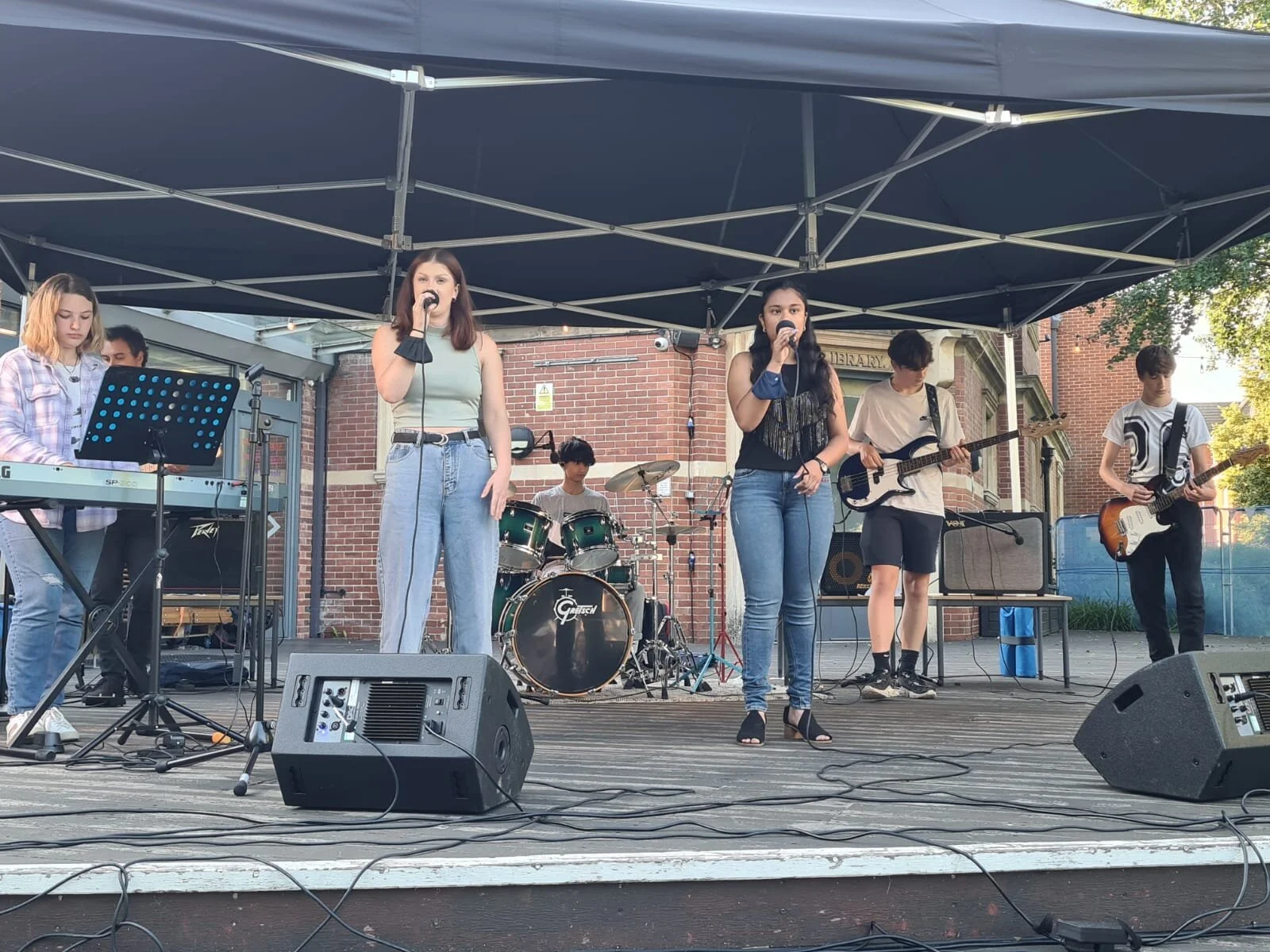UK Music found that the UK music industry contributed £5.2 billion to the UK economy in 2018. There are countless ways you can play your part in this exciting and growing industry. Whether you’re getting qualifications to help you in the future, on an education course to learn new skills, or getting hands-on experience, you can get involved, meet new people, and get ready for the future.
An Audience With…
Hear from and interact with music industry professionals, in partnership with Turner Sims
Careers Advice
Qualifications
Music Exams, including
If you’re having music lessons with Southampton Music Services, your music teacher will be able to help you prepare for, and take exams. Get in touch to find out more.
Further and Higher Education
Further Education for Music:
In Southampton
On the Isle of Wight
Rock School (11-16)
BTEC (L2)
BTEC (L3)
Higher Education for Music:
In Southampton:
On the Isle of Wight
BA Hons
Masters
Surrounding Areas:
Beyond:
Where to look for opportunities
Opportunities Board from Youth Music
Sign up to their newsletter to get emails about opportunities for young musicians.
Funding, Grants & Competitions
Occurs yearly
For ages 22 or under
Must include improvisation in your piece
Future Talent offers two programmes supporting gifted young musicians from low income backgrounds across the UK.
Development Programme for musicians aged 13-17 years old
Junior Programme for younger musicians at an earlier stage of musical development
to build confidence
develop personal skills
enhance your musical experience
Help Musicians (Develop Your Career)
For ages 18 and over
Multiple rounds in a year
18-25 year olds
Up to 30 year olds (if you identify as D/deaf or disabled)
Living in England, Scotland, Wales or Northern Ireland
Grant of up to £2,500
DIY (Do it yourself)
How can you build your creative identity and share your music with an audience?
Here are some ideas to get you started…
Find collaborators
Building a creative career on your own is hard! The creative industry thrives on collaboration and teamwork, so be open to working with your peers, friends, or reaching out to people who inspire you and can help you along the way. Have fun creating and trying out new things!
Do you have any friends who make art, draw, paint, or collage that would make an artwork for a Single/EP cover for you? Or is this something you would like to try out yourself?
Do you know anyone who likes photography that you could do a photoshoot with or that would take pictures of you performing?
Are any of your friends or peers good at creating stories - could they brainstorm an idea for a music video with you?
Do you know other people who play or make music? Could you make a piece of music with them? Could you rehearse together and learn from each other? Could you start a band together?
Find and go along to a gig, festival, open-mic night or other event to meet new, like-minded people
Start a band
Do you know anyone else who makes music and would want to start a band with you? A band can have as little as two members and as many as you find suitable. A four-piece band is the most common in rock and pop music, but there are many different types of bands and a band can have varying types of musicians in it. It can have more than one of each type of musician and sometimes musicians play more than one instrument.
Here are some examples of roles within a band:
Bassist (guitar / upright / synth / more)
Brass player (french horn / trumpet / tuba / more)
DJ
Drummer / percussionist
Guitarist (electric / acoustic / rhythm / lead)
Keyboard / Piano / Synths
Singer / vocalist / rapper / MC / more
String player (cello / viola / violin / more)
Woodwind player (clarinet / flute / saxophone / more)
And many more
What kind of skills will you need and develop to be in a band?
Committed and reliable: you will need to be committed and reliable, a band requires rehearsals so you will need to set aside time to rehearse together and show up on time.
Communication and teamwork: working well with others is an important part of being in a band, and to be successful you’ll need to communicate clearly and calmly. It’s not always easy, and there will be disagreements to resolve, but as you overcome challenges, you’re learning important skills which will help you in the future.
Creativity: writing songs, coming up with parts to play, creating setlists, and more - it all takes creativity.
Put on your own gig
Having a safe space to perform your music in front of people you know and trust can be a fun way to develop your performance skills and feel supported. Is there a friend or family member who would let you put on a show in their living room or garden? Can you collaborate with other friends to plan the event and line-up? Make sure to get permission from a trusted adult.
Skills involved:
event planning
designing promotional material (flyers/poster)
marketing (how will you share your flyers in the community - can a local shop put them in their window?)
performance
You will need to plan:
Date/Time of the gig
Location of the gig
Who is involved & what will their role be?
What equipment will you need? (instrument, sound system/speaker, just yourself)
How many people will be able to attend?
Who will you invite? (family members, friends, people from the local community)
How will you invite them? (by personal invitation only or by open invitation through putting up posters/handing out flyers/sharing on social media)
Promotional Material (if you want invitations, posters or flyers, who will design them? What materials will you use? Will they be physical or digital? What information do you need to put on them?)
What will you perform? (create a setlist of music/songs that you want to perform)
Other performers (do you have any other friends that would want to perform? It doesn’t have to be a musical performance)
Promoting and Sharing Your Music
Who can I send my music to / where can I upload tracks?
Once you have made an account, including information such as your artist name, postcode and what kind of music you make, BBC Music Introducing allows you to upload your tracks to their platform. These tracks are then sent to BBC’s local radio shows and will be listened to by a team of local presenters and producers.
Through this, many emerging artists have had their music played on local radio stations and even major radio stations such as BBC Radio 1, 1Xtra, Radio 2, Radio 3, 6 Music, Asian Network and World Service.
South Coast Music Show on Voice FM
The South Coast Music Show on Voice FM play new music from local artists every single week, from 4-6pm on a Sunday. You can send your tracks in on their website.
Also try:
Upload tracks to SoundCloud
SoundCloud is a free streaming platform, used by artists and DJs to share their music and mixes.
Find useful guides on how you can create your own account and upload your music here.
Get in touch with local music promoters / venues / festivals
Getting involved in your local music scene is a great way to meet people, make connections and get your music heard! Start small by contacting local venues that host events such as open mic nights, apply to play at small local festivals, find out what’s going on in your area and if there are any opportunities available to you.
Local Radio Stations
Southampton
IOW
Coming soon
Brighton
Portsmouth
Other local creative organisations
There are lots of different creative organisations in Southampton with groups and workshops you can attend and opportunities you can take part in. Here are a few:
Artful Scribe (develop your writing)
City Eye (develop your film making)
DIY Southampton (independent music events)
Find other cultural opportunities through Southampton Cultural Education Partnership or IOW Cultural Education Partnership
We’ll never have it all.
Find events in Southampton at Visit Southampton.
Tell us about venues, events and places to find music you know about!

